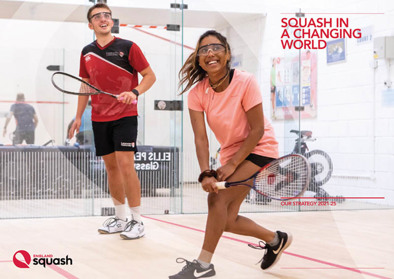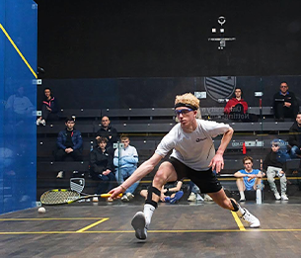 Back
19 September 24 - by England Squash
Back
19 September 24 - by England Squash
Championing gender equality across our competitions and talent pathways

England Squash are making positive strides towards gender equality within competitions and junior talent pathways thanks to a number of new initiatives.
As shown through key initiatives such as Women’s Squash Week (16-22 September) and the Rally Together campaign, which encourages all squash clubs to take action to become more inclusive for women and girls, England Squash are committed to increasing playing opportunities for female players.
In March, a new selection criteria for the Aspire Team Championships was implemented to ensure talented girls can compete at the highest level. Regions are now required to select 12 boys and 12 girls in their 24-person squads, with four boys and four girls from each age-group (U17s, U15s, U13s/U11s). Each squad contains three teams of eight, playing across Divisions One, Two and Three, with these teams following the same 50-50 gender split.
At the 2023/24 National School Championships, meanwhile, the introduction of a mixed team competition at KS5 level contributed to the overall number of girls participating at the event increasing from 235 in 2022/23 to 389. 17 teams entered the mixed competition, with two girls and two boys per four-person team.

The latest initiative, rolled out in September, saw the separation of the mixed Under-9s category, with split boys’ and girls’ rankings and competitions moving forward. Despite the Under-9s age-group only launching three years ago, England Squash have seen an increased number of girls in the rankings and it is hoped the split will encourage even more girls to compete.
And later this year, the new Squash Super League will become the first elite squash league in the world to offer equal prize money for male and female players.
“We’re fortunate to have some fantastic young girls coming through and it will be great to see them on the big stage one day," says England Squash Competitions Manager, Laura Mumford.
"It’s a particularly exciting time for squash with the Olympics coming up in 2028 and the likes of Gina Kennedy championing women in the professional game.
“But we often have smaller draws and fewer entries [in girls’ competitions] for a mixture of reasons and we want to stop that happening and inspire and empower girls to compete at the higher level.
“Splitting the Under-9s category is one of the best moves for the girls. You could be the best girl at Under-9s but only ranked seventh when it’s mixed. Now, you can actually see it on the ranking site which will inspire them and encourage them to compete with girls who are their own age.”

Addressing equal prize money, Laura adds:
“We’ve got equal prize money across the board: the British Junior Open, British Junior Championships, English Junior Championships, and the new Squash Super League.
“Unlike in tennis, men and women play the same number of games. There’s no reason whatsoever why the prize money shouldn’t be the same and it shows we think the women’s game is as good as the men’s.
“Girls should be expecting to have the same opportunities as the boys, so having equal prize money from such a young age means they go through squash on an even playing field.”
Over the next 12 months, England Squash are targeting a 20 per cent increase in the number of girls in the junior rankings, taking them up to 600 girls. This will include a 25 per cent increase in the Under-9s age-group.
A female-only competition series is also in the pipeline.
Learn more about England Squash's junior competitions and talent pathway for 2024/25.














-3.png)

 (2).png)
.png)
-1.png)
.png)
.png)
-1.png)


 (1).png)
.png)

